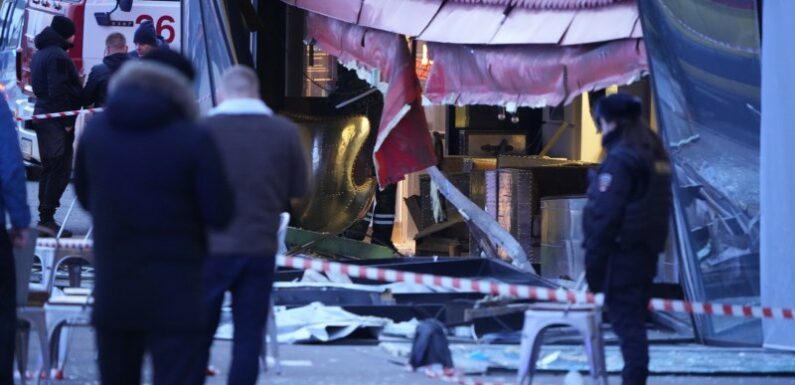
Well-known Russian military blogger Vladlen Tatarsky was killed by a bomb blast in a St Petersburg cafe on Sunday in what appeared to be the second assassination on Russian soil of a figure closely associated with the war in Ukraine.
Russia’s state Investigative Committee said 19 other people were wounded in the blast, and it had opened a murder investigation.
Police officers at the scene of a bomb blast at a cafe in St Petersburg on Sunday.Credit:AP
Tatarsky, whose real name was Maxim Fomin, had more than 560,000 followers on Telegram and was one of the most prominent of the influential military bloggers who have championed Russia’s war effort in Ukraine while often criticising the failures of the army top brass.
“We’ll defeat everyone, we’ll kill everyone, we’ll rob everyone we need to. Everything will be as we like it,” he was shown saying in a video clip last September at a Kremlin ceremony during which President Vladimir Putin claimed four occupied regions of Ukraine as Russian – a move rejected as illegal by most countries.
There was no indication of who was behind the blast.
TASS news agency quoted an unnamed source as saying the improvised explosive device was hidden in a miniature statue that was handed to Tatarsky as he addressed a group of people in the cafe.
The explosion tore through the cafe and reportedly killed pro-Russian blogger Vladlen Tatarsky.Credit:AP
Mash, a Telegram channel with links to Russian law enforcement, posted a video that appeared to show Tatarsky, microphone in hand, being presented with a statuette of a helmeted soldier. It said the explosion happened minutes later.
Tatarsky’s death followed the killing last August of Darya Dugina, the daughter of a prominent ultra-nationalist, in a car bomb attack near Moscow.
Russia’s Federal Security Service accused Ukraine’s secret services of carrying out that attack, which Putin called “evil”. Ukraine denied involvement.
Russia’s war bloggers – an assortment of military correspondents and freelance commentators with army backgrounds – have enjoyed broad freedom from the Kremlin to publish hard-hitting views on the war, now in its 14th month. Putin even made one of them a member of his human rights council last year.
Reuters
Get a note directly from our foreign correspondents on what’s making headlines around the world. Sign up for the weekly What in the World newsletter here.
Most Viewed in World
From our partners
Source: Read Full Article

